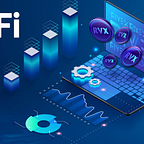The Relevance of Artificial Intelligence in Cryptocurrency Markets
“The key to artificial intelligence has always been the representation.” — Jeff Hawkins
Let’s just be honest — the real implications and use-cases of whether it’s artificial intelligence (AI) or blockchain technology, are far less than they are thrown around in the fintech world. When we talk about AI, people generally tend to associate it with a utopian world where machines will rule humanity. Well, it suffices to say, that’s a bit of an exaggeration of the technology. Looking at the definition of artificial intelligence, Wikipedia defines it as intelligence demonstrated by machines, unlike the natural intelligence displayed by humans and animals. Basically, it’s a methodology through which machines can be trained to mimic and execute specific tasks, that have the best chance of achieving a specific goal. Considering it has access to enough historical data to learn and based these tasks upon.
For example, we’ve been seeing the growth of AI in self-driving cars. In this case, the machine is trained to acknowledge all the external data through a range of sensors and cameras and process it in a way to avoid a collision. Thereby, measuring the consequences of any action they take, as each action will impact the end result. The end result, in this case, is to avoid a collision.
Now that we’ve settled on the fact that AI is not going to be machine overlords who will make us, the humanity, slaves at their mercy. Let’s get into the relevance of AI in cryptocurrency. Similar to AI, blockchain technology and cryptocurrency are poised to revolutionize the finance as well as tech space. So, first of all, let’s have a look at the actual use-case of artificial intelligence in blockchain technology -
Interaction of Nodes on a Blockchain Network
In a blockchain network such as Bitcoin or Litecoin, all the nodes continuously interact with each other and use the Proof of Work (POW) consensus model to validate new blocks. However, this consensus model first presented by Satoshi Nakomoto has major drawbacks such as high energy consumption and vulnerability to 51% attacks.
Recently, we saw two such attacks on the Ethereum Classic, that too in a span of one week. Although no information system or technology can be claimed to be 100% secured. However, with the help of AI, a system can be trained to predict future authenticity by evaluating the past behavior of the system.
For example, an ambitious project called Fetch.AI has come up with a unique consensus algorithm called Useful Proof of Work (uPoW) offering several benefits over the traditional Proof-of-Work algorithms using the AI.
Unlike in the traditional PoW model, where nodes must download every block and add them to the chain sequentially, Fetch.AI with its uPoW will deem any transaction valid once it’s confirmed by two nodes leaving computational resources free to train the AI. Fetch.AI also uses natural language processing and machine learning algorithms to train the network from being manipulated by scammers to run fraudulent transactions.
Processing the Big Data
Similar to Fetch.ai, another promising project called DxChain also seeks to employ machine learning and big data to store, trade, and compute big data within a decentralized framework. For the consensus model, it uses the Proof of Spacetime(PoSt) protocol and aims to design a platform to solve the problems of computation of big data in a decentralized manner with the help of AI.
In 2017, data surpassed oil as being the most sought-after commodity and it’s no surprise that the importance of controlling your personal data has found its way into the blockchain tech.
Currently, only big companies have the capability to run these big data tasks because it requires expensive hardware and also the reason that these companies own most of the existing consumer data. However, DxChain claims to change this using the distributed ledger technology powered by artificial intelligence.
Automated Trading
Automated trading is probably the most mainstream use case of artificial intelligence with cryptocurrency. Within the last few years, since the COVID-19 Pandemic, cryptocurrency trading is growing a popular appeal.
However, at the same time, the unpredictability and market volatility of cryptocurrencies continues to dramatically risk the investments. Also, when it comes to financial markets, it’s practically impossible to prevent human emotions while making important trade decisions.
There comes in the picture — AI-based trading bots. These bots can be trained to act solely based on historical data to make informed trading decisions without being overruled by human emotions.
There are multiple pieces of research proving AI can help with the cryptocurrency price prediction model with precise accuracy provided enough sample set and depending upon the nature of the involved machine-learning model. Already major exchanges such as Binance and Kraken let traders use their API allowing them to use third-party trading bots.
So we’ve discussed several use-cases of artificial intelligence in reference to blockchain technology and cryptocurrency. We also talked about projects such as Fetch.AI and DxChain that are using AI along with distributed ledger technology. Well, these are not the only projects that are diving into AI along with blockchain technology.
Apart from these projects, a few other notable projects delving into similar tech are Ocean Protocol, Velas, Numeraire, Project Pai, and many more. Currently, there are more than 90 cryptocurrency projects that are connected to the AI industry and holds a market capitalization of over $740 million in total. We hope to see more projects superimposing the greatest tech ideas of the 21st century — AI & Blockchain.
So, that’s all for today. Tell us in the comments, which AI-based altcoins or DeFi platforms look most promising to you.
